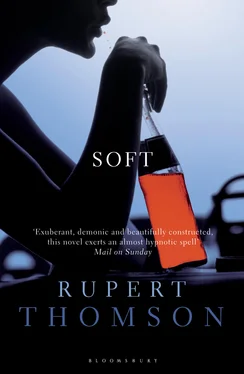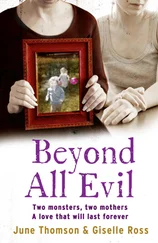They left the car on a patch of wasteground near a roundabout and then walked back, picking their way gingerly through thistles, coils of wire, bricks. From a distance Barker could see the club — a low square building with a scribble of electric blue above the entrance. There was a BMW outside, there was a jeep with tyres like a tractor’s. A chauffeured Daimler dawdled by the kerb, its engine idling. On the top step two doormen stood in a deluge of ultraviolet, their faces looking tanned, their teeth freshly enamelled. Charlton stopped for a word on his way in. Barker nodded, but didn’t give his name.
They had only been inside the club for half an hour when Charlton started talking to a girl in a strapless silver dress. I feel lucky . Barker thought she was trouble — he had worked on doors for long enough to recognise the type — but this was Charlton’s territory, and he didn’t want to interfere. Once, he tried half-heartedly to steer Charlton towards the bar, but Charlton resisted and, grinning, turned and introduced him to the girl. Annabel. Or it could have been Charlotte. All Barker could remember afterwards were her pupils, which were tiny, like punctuation, and her white-blonde hair, which looked as if it had been polished.
It was a fight with fists and bottles. Barker caught somebody in the solar plexus with an uppercut. His father had taught him the punch when he was six: one brutal arc, nine inches start to finish. The man dropped to his knees and vomited what looked like a half-chewed McDonald’s Quarter Pounder with Cheese on to the tarmac. Out of the corner of his eye Barker saw Charlton shove somebody else’s face into a wall. The crunch of skin and bone on pebbledash. In the end, though, they had to run for it. Down an alley, back across the vacant lot. Charlton slammed the Sierra into first gear and raced it over weeds and potholes. The suspension floundered, winced. It sounded more like a bed with people fucking on it than a car.
‘That bloke,’ Charlton said. ‘He ought to bite his food up.’
He grinned into the rear-view mirror, his face pale and greasy, his left cheek-bone grazed, already swelling.
‘There’s one of them won’t be doing that for a while.’ Barker propped his right knee against the dashboard. He could still hear the neat snap as someone’s front teeth broke. The impact had ripped a hole in Barker’s trouser-leg and torn the skin beneath.
‘You better get yourself a rabies shot,’ Charlton said.
They stopped on Mile End Road and bought fish and chips, which they ate in the parked car. Though Barker was angry with Charlton for involving him in something so futile, so unnecessary, he could at least console himself with the thought that he had come to Charlton’s aid. His stock had risen, as Charlton would probably have said.
Barker stared through the windscreen, his bag of chips warm and damp on his lap. Wind scoured the streets. The scuttle of litter.
‘We could’ve done with Ray tonight,’ he said.
He turned and looked at Charlton, who bent his head sideways and bit savagely into a crispy orange slab of cod.
‘Sod it,’ Charlton said. ‘We did all right.’ He spoke through splintered flakes of fish.
‘Grasp Sparrow By The Tail,’ Barker said.
Charlton grinned. ‘Drive Away Monkey.’
One morning in early spring the door of the barber’s shop opened, the bell tingling, and Charlton walked in. Sighing loudly, he eased down on to the red plastic bench, picked up a magazine. Barker had a regular in his chair, a long-distance lorry-driver who came in every three weeks for a trim. As Barker’s scissors chattered up the left side of the lorry-driver’s head, he glanced at Charlton in the mirror. Charlton was wearing a camel coat over a dark-grey suit, and a pair of brogues that somebody had cleaned for him.
‘Got yourself a new woman?’ Barker said.
Charlton passed one hand gently over his cropped black hair, then turned and spoke to Higgs. ‘You the boss?’
Higgs nodded.
‘How much are you paying him?’
‘About two f-fifty an —’
‘Good,’ Charlton said. ‘Because that’s all he’s worth.’
Barker smiled as he reached for the clippers and began to shave the hairs at the base of the lorry-driver’s neck. Higgs was bewildered, though. Blinking rapidly, he folded a towel and draped it over a chair.
‘Does he get a lunch-break?’ Charlton asked.
‘One-thirty,’ Higgs said without looking up.
Barker glanced at the clock above the mirror. Quarter-past.
Charlton spoke to Barker for the first time since he’d walked in. ‘There’s a café down the street, the something Grill. I’ll see you there.’
Barker nodded. Bending low, he watched the scissors closely as he steered them round the top of the lorry-driver’s ear. Short white hairs dropped through the air, thin as the filaments in lightbulbs. He hadn’t seen Charlton for at least a month. In February they had met in a pub in Stepney and drunk pints. Later that evening they had dropped in on a friend of Charlton’s, a stand-up comedian, who had offered them cocaine. Charlton did a couple of lines. Barker said no. He listened to them talk for half an hour, their eyes fixed, glittering, their thoughts fascinating and important to each other, then he walked back to his room in Whitechapel.
‘Friend of yours?’ Higgs said when Charlton had gone.
Barker dusted the lorry-driver’s neck with talcum powder and whisked the few loose hairs away with a soft brush. ‘He did me a favour when I first moved up here. He’s all right.’
Higgs turned away, shaking his head.
In the café Charlton was eating toast, his pale lips shiny with butter. He was still wearing his coat. Barker sat down opposite. When the waitress came, he ordered a chicken-salad sandwich and a Coke.
‘You still in that shitty little bedsit?’ Charlton said.
Barker didn’t answer.
‘I’ve got a business proposition for you.’ Lowering his head, Charlton reached out with his lips and drew the top half-inch off his cup of tea. It was a strange sound, like something being played backwards.
He told Barker he had heard about a flat. It was five minutes’ walk from Tower Bridge. Good area, he said. Central.
Barker waited.
‘Only one problem,’ said Charlton, taking out a cigarette and lighting it. ‘There’s people in it.’
‘You mean —’
‘That’s right. Can you handle it?’
Barker looked at the table.
‘You were a bouncer, right?’ Charlton said.
‘How many people?’ Barker asked.
‘Three.’
Barker looked up again. ‘And if I do the job, the place is mine?’
‘For a while.’
‘What’s that mean?’
‘Six months. Maybe longer.’ Charlton lifted the two fingers that held his cigarette and pressed them to his mouth, the back of his hand facing outwards, the thumb and little finger spread. His cheeks hollowed as he sucked the smoke into his lungs. ‘You’d have bills to pay, but no rent. You could even have a phone. Just like a normal fucking human being.’
On his next day off, which was a Sunday, Barker walked south through Shadwell, crossing the river at Tower Bridge. The few people who were out looked at him oddly. It must have been the sledgehammer he was carrying. By ten-thirty he was positioned opposite the building Charlton had told him about. Behind him stood a warehouse that had once belonged to a leather company; the loading bays had been painted a sickly orange-brown, and the hoists lay flush against high walls of inky brick. It was a quiet street. To his right, he could see green metal gates, some early roses. Trees rushed in the wind.
Can you handle it?
Читать дальше












